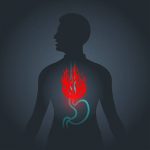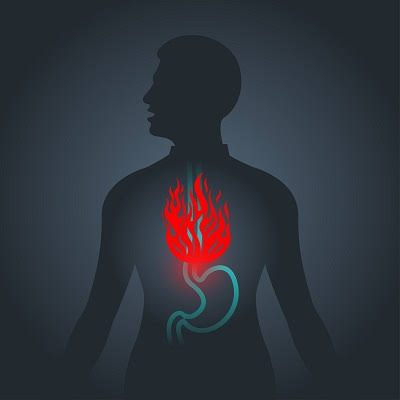Most times when we experience heartburn, we blame it on the spicy meal we ate. However, asides food, being overweight, smoking, & even your sleeping position can cause heartburn.
1. What is heartburn?
Heartburn is that awful burning sensation in your chest or throat, usually when acid rises up from your stomach. It
is a symptom. It is not necessarily a disease but an indicator of an irritation or disease depending on the severity.
The condition can be a symptom of conditions like – GERD (gastroesophageal reflux disease) caused by long term acid refluxing back into the oesophagus. If it occurs as often as 3 times a week, it could point to conditions like scleroderma and sarcoidosis, heart attack.
Symptoms of heartburn include:
•Burning pain in the chest that usually occurs after eating and may occur at night when asleep
•Pain that worsens when lying down, bending over or after a heavy meal.
•Bitter or acidic taste in the mouth.
2. Foods that causes or triggers heartburn
- alcohol, particularly red wine.
- black pepper, garlic, raw onions, and other spicyfoods.
- tomatoes
- citrus fruits and products, such as lemons, oranges and orange juice.
- coffee and caffeinated drinks, including tea and soda.
- peppermint.
- chocolate
- Salty foods
- Beans (very common)
- Milk
- Fatty meats (oil meat)
2. Is heartburn the same as acid reflux?
No. Acid reflux is a common medical condition that can range in severity from mild to serious. Gastroesophageal reflux disease (GERD) is the chronic, more severe form of acid reflux. Heartburn may be a symptom but they’re not the same.

Credit: Remington
It is not a condition on its own, and it has nothing to do with the heart. Instead, it is a symptom of acid reflux. If symptoms of acid reflux occur frequently, it can indicate that a person has gastroesophageal reflux disease (GERD).
Distinguishing between heartburn, acid reflux, and GERD may be hard, because they may all feel the same in the moment. However, understanding the differences can help a person find the right treatment.
3. Is heartburn related to a heart attack?
No. It can, however, accompany other symptoms of a heart attack. The main difference between is that heartburn tends to be worse after eating and when lying down, but a heart attack can happen irrespective of mealtimes.
Also, it does not cause symptoms like breathlessness while a heart attack can come with chest pain, breathlessness, pain in the lower jaw, left arm, dizziness or lightheadedness. Also, a heart attack does not cause bloating/belching, but these can happen with heartburn.
4. Can acid reflux make your teeth sensitive?
YES. Constant reflux erodes the tooth enamel and wears down the structure, causing pain.
5. Should I drink milk when I have heartburn?
NO. Doctors do not recommend drinking milk to reduce heartburn, as it has been proven that milk temporarily reduces the symptoms only to later increase acid production by the stomach, which causes more heartburn.
6. When should I be worried?
-If it lasts for days
-If there’s no relief while standing/after taking antacids
-If you’re breathless, dizzy & feel a sharp pain in the left arm or jaw
-If you cough & it’s slightly bloody
-If it comes with severe pain in the middle of the chest
7. What are the possible complications of heartburn?
• Oesophageal irritation
• Ulcers
• Gastroesophageal reflux disease (GERD)
• Serious damage from GERD to your oesophagus or precancerous changes in the oesophagus called Barrett’s oesophagus.
8. What should I do when Heartburn calls? Home Remedies
• Do not drink citrus juice or pineapple or apple juices as they are very acidic. Try juices or smoothies made from pineapple, carrot, watermelon, spinach, milk shakes, ice- cream, cucumber, or pears. These foods help relieve acid reflux and heartburn.
•Do not medicate immediately with antacids.
• Drink fat-free milk or plant-based milk like almond or soy milk.
• Stand upright. Avoid lying down or bending over as these worsen the burns.
• Chew gum – this stimulates more saliva which neutralizes it.
Credit:
Healthline
WebMD





















